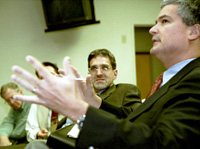Operation Iraqi Freedom has sparked a new debate on whether embedded reporters are ethical. Loyola’s chapter of the Society of Professional Journalists sponsored a panel discussion on that topic April 29 in recognition of National Ethics in Media Week (April 24- May 3).
Loyola communications professor Larry Lorenz was joined by Paul Greenberg, professor of media ethics at Tulane University and Times-Picayune employment columnist; Peter Kovacs, Times-Picayune managing editor; and Keith Esperes, vice president and news director of New Orleans’ Fox affiliate, WVUE.
The discussion focused on recent media coverage of the war on Iraq.
The panelists were divided on the issue of embedding journalists with troops.
Greenberg said embedding is likely to forge relationships between journalists and service people, which could compromise objectivity.
He said he feared it would “color or taint reporting.”
Lorenz said there are good and bad aspects of the process.
“Being close to troops gives a better perspective. On the other hand, it’s a very limited view of what’s going on,” he said, likening it to the second dog’s view in a sled team.
Though The Times-Picayune sent reporter James Varney to Iraq, Kovacs’ greatest concern was not the ethics of the issue but rather the economics.
“The discussion in the newsroom before we sent [Varney] was about insurance,” Kovacs said.
“It cost a fortune.”
But all agreed that the extensive coverage by all media outlets provided consumers with a jigsaw puzzle of information, the close inspection of which revealed a clearer picture of the events unfolding.
From the broadcast perspective, Esperes noted that consumers’ desire for instant access and “America’s lust for trying to boil everything down very quickly” did lead to some misinformation but that the truth eventually emerged, “once you realize not every sentence you got from everyone was gospel.”








